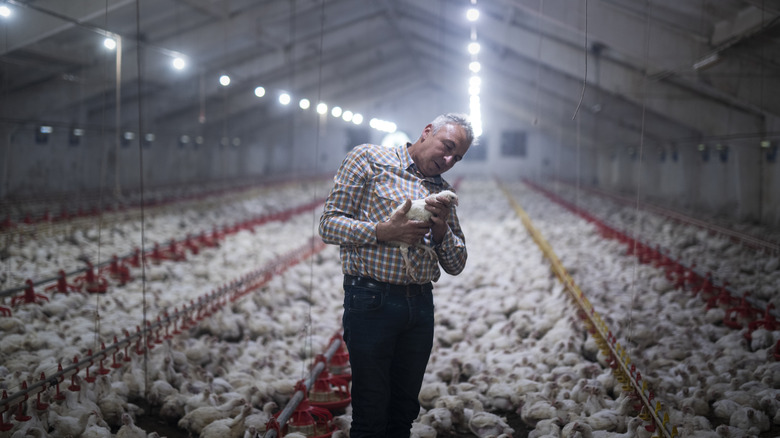Why British Eggs Don't Go In The Refrigerator
America and Britain love trading barbs (not to mention the occasional musket fire), and one of the topics we can't seem to get enough of is the way each nation stores its food. The fact that most Europeans don't refrigerate milk while Americans do has elicited baffled responses from both sides of the Atlantic, but did you know that the same is true for eggs? Walk into a British grocer and you won't see a single egg in the refrigerated section. Instead, you can find the cartons at room temperature, stacked side-by-side with canned goods and other nonperishables.
This will surely be a shocking sight to any American abroad, but our fellow Anglophones across the pond are actually in the majority. The U.S. is one of the few countries in the world where eggs are sold in the refrigerated section, along with Japan, Australia, Canada, and the Scandinavian nations. Anywhere else, it would be an anomaly to see eggs in a refrigerator, either in stores or at home.
Whether it's customary to refrigerate eggs or not comes down to the methods each country uses to manage harmful bacteria, particularly salmonella, which can cause the eggs to spoil and lead to food poisoning. There are two main schools of thought when it comes to fighting salmonella in eggs: washing eggs and vaccinating chickens. Countries that follow the first method also refrigerate their eggs, while countries that vaccinate chickens do not, but is one method better than the other?
How the U.S. and Britain manage the salmonella threat
On the farm, eggs may come into contact with salmonella through infected material such as chicken feces, which can cause the bacteria to leach in through the eggshell. To prevent this type of infection, the U.S. Department of Agriculture requires all egg producers in the country to wash their eggs before they're sold. And to be in compliance, these eggs go through a machine that lathers them up with soap and hot water before they are dried and sprayed with a chlorine solution.
This process is effective at eliminating bacteria on the eggshell, but it also strips away a protective oily layer around the shell called the cuticle. The drawback for a chlorinated wash is that, while the egg has been rid of pathogens, it is now more vulnerable to future contamination. To prevent this, eggs must be refrigerated at a temperature below 45 degrees Fahrenheit from the moment they're washed to the moment they're cooked.
Salmonella can also be transferred to eggs if the mother hen is infected. In Britain, and most other nations, they focus more on this type of threat, vaccinating all egg-laying hens to prevent them from transferring harmful bacteria to their eggs or feces. They do not wash their eggs, allowing the cuticle to remain intact, and making refrigeration unnecessary. The European Union actually recommends that eggs not be refrigerated, as repeated cycles of cooling and warming that might occur while transferring the eggs can cause condensation to form on the shells, which could harbor bacteria and potentially permeate the shell.
Both methods of salmonella prevention work just fine
But the United States wasn't always an outlier in terms of how we treat our eggs. A century ago, egg-washing was compulsory in most countries, but the technology of that era was simply not up to the task. Improperly washed eggs were vulnerable to bacterial invasions, and Britain ultimately changed course when a batch of washed eggs imported from Australia turned up rotten. Meanwhile, America charted a much different course, with the USDA developing advanced egg-washing machinery in the 1970s that could reliably eliminate bacterial invaders.
Neither the United States nor Britain experiences mass-scale egg safety issues, so it seems that both methods are fairly reliable. While the USDA maintains washing eggs is a more reliable means of salmonella prevention, a meta-analysis put out by The Lancet reported that the U.S. actually has a higher rate of salmonella infection than the U.K. and most other European nations.
Given that egg washing and hen vaccination target different means of salmonella transfer, a combination of both methods would likely be the most effective means of prevention, something which is becoming ever more common here in the States. A serious salmonella outbreak in 2010 got a lot of American farmers to take up vaccinating their hens, even though the USDA doesn't mandate it. Now, many of the eggs you'll find in American fridges have been treated for salmonella both inside and out, but there's a limit to how long eggs will last in the refrigerator before the danger returns.


